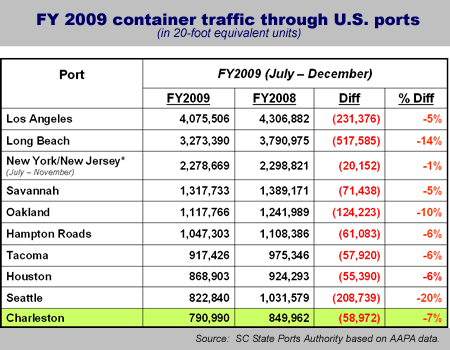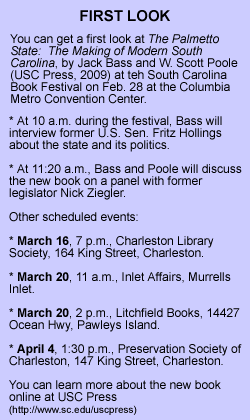
Retooling the SPADoes restructuring go far enough or too far?By Bill Davis, senior editor FEB. 20, 2009 -- The State Ports Authority’s ship may not have come in, yet. But, thanks to a drop in revenues and a resigned executive director, interest in the goings-on at the state-owned enterprise have risen in the General Assembly.
 Just this week, a Senate committee approved a bill that would restructure the governance of the SPA board and limit the governor’s ability to remove its board members. Just this week, a Senate committee approved a bill that would restructure the governance of the SPA board and limit the governor’s ability to remove its board members.
The SPA also agreed to almost $500,000 deal with consulting firm Norbridge to develop a long-term strategic plan, even though it is yet to name a successor to Bernard Groseclose, who stepped down earlier this year during a performance evaluation.
SPA spokesman Byron Miller, apparently wary of being drawn into any intramural politicking that comes with proposed legislation, declined to comment on the restructuring bill.
Legislature to keep watch on ports
“But, don’t think this is the last time the legislature will turn its attention to this issue,” said state Sen. Brad Hutto (D-Orangeburg), whose district is at the beginning stages of a 25-year plan to construct a massive “inland port” distribution center.
 The SPA, with its three unconnected ports, has seen the Charleston facility’s national rankings drop from second busiest port on the eastern seaboard to the fourth. At the same time, its business dropped 5 percent in fiscal year 2007 and an additional 10 percent in FY 2008. The SPA, with its three unconnected ports, has seen the Charleston facility’s national rankings drop from second busiest port on the eastern seaboard to the fourth. At the same time, its business dropped 5 percent in fiscal year 2007 and an additional 10 percent in FY 2008.
Despite the recent drops, Hutto argued the state’s reliance on its ports and their proximity to major eastern seaboard population centers will continue to attract major import business to the state.
But is replacing the governance structure, or key players, really the answer? Should the state be thinking about, as Gov. Mark Sanford has championed, moving the actual running of the ports into a more business-friendly model which accepts private investment and expertise?
Time to change models?
In short, should the state be sending a bureaucrat to do a business professional’s job?
The argument goes something like this. A college football program has run the same, antiquated veer offense for the past 70 years. Then, when it starts to lose its spot in the rankings, it recruits new players, replacing Jim Brown with Walter Payton.
Sure the program may enjoy initial success, but eventually, a level playing field is needed.
Hutto liked the analogy. Senate President Pro Tempore Glenn McConnell (R-Charleston), one of the biggest agents for change since the biggest SPA facility is located in Charleston, understood it, but said a committee would meet to discuss the business model later in the year.
But is all this hullabaloo needed? Consider the port has had a good run over the past 15 years. In 1995, the port saw business jump 17 percent; in 2000, 17 percent, and 2005, 14 percent.

That port tonnage dropped 7 percent over the last six months of 2008 in Charleston gives credence to the argument that the recent downturn is a natural part of business cycles. Especially in a national recession, especially with the SPA’s major client, Maersk, threatening to leave?
A case in point in the cyclical nature of port business also involves Maersk, and has become a case study in national port business lore. Maersk Sealand, as it was known then, was a big customer at the Long Beach port facility in California in 2003 when it announced it was leaving and taking nearly a quarter of the ports business to the Los Angeles facility.
It took three years, but the port bounced back.
Consider also that, unlike ports in many other states, South Carolina facilities are funded independently from general fund budgets, making them appear less stable than perhaps they really are.
Consider also that the SPA has seen no expansions since the Wando terminal came online in the 1990s. In fact, SPA was dealt a major defeat a few years ago when it tried to expand to a new, all-inclusive spot along the Cooper River on Daniel Island near Charleston.
Instead of being able to tell business partners like Maersk and other shippers that expansion was on the way, they we’re shot down by a coalition of legislators, environmentalists and anglers, who didn’t want more trucks on their roads or increased shipping traffic in their waters.
A single, huge port, like the one being planned for Jasper County along with the State of Georgia, has the advantages that come with massive size, where economies of scale and efficiencies can bring down costs and push up profits.
Crystal ball. Should the SPA lose accounts like Maersk, all the while handing out hundreds of thousands of dollars in end-of-the-year bonuses to its employees and brass during the worst economic climate since the Great Depression, its board members won’t get a lot of love from the legislature, and more meddling should be expected. What new does Norbridge, the consulting firm brought in to work on the long-term strategic plan, have to say now, since they‘ve been doing work with the authority for at least 10 years? That Sanford has pushed for private management may be its biggest minus, as many in the legislature remain wary of working with him or any idea he espouses. But, as Hutto pointed out, all that will likely get worked out because the state’s “geographics” are good: deep water + I-95 + railroads = success.
RECENT NEWS
|

Budget to hit House floor
Committee agendas in both the House and Senate will be light next week as major bills will continue to be debated in both chambers.
In the House, look for a proposed $5.6 billion 2009-10 state budget to hit the floor, but House rules dictate that lawmakers will have to wait two weeks before discussing it in the chamber. In the Senate, the tax realignment committee (TRAC) review study will be discussed in committee and on the floor, as will changes to the structure of the Employment Security Commission.
Also in the Senate, the full Education Committee will meet Wednesday at 10 a.m. to discuss a series of bills.
|

Cigarette tax squabble ahead
Thanks to the ills impacting South Carolina’s economy, federal health care matching dollars have grown to nearly a 4:1 ratio, according to health care lobbyist Allan Stalvey and House Minority Leader Harry Ott (D-St. Matthews).
That’s sure to provide fuel in a coming debate over increasing the cigarette tax because steering more money toward federal matching monies could generate more overall dollars to the state, while other cigarette tax proposals simply seek to cover state budget shortfalls.
Reading between the lines, this means there's a better-than-ever chance this year for a cigarette tax hike.
It looks like anti-cigarette tax advocates might just have a tougher time now that House Speaker Bobby Harrell introduced a plan this week to use a 43-cent increase in the state’s per-pack cigarette tax to underwrite small business tax breaks and subsidies to cover health insurance premiums for the working poor.
Ott (D-St. Matthews) praised the speaker’s plan for being “on target,” but complained that target wasn’t big enough.
“The speaker’s plan would cover people making 200 percent of poverty level; we’re going to try and get that to 250 percent,” said Ott.
Harrell later defended his bill, saying, “it’s like I told Harry to his face, 200 percent is the right number.”
Harrell scuttled a cigarette tax increase last year because he felt it expanded state Medicaid instead of coverage. Members of the House also discussed a separate 41-cent increase in the cigarette tax by 41 cents to cover budget shortfalls.
“I went to bed Wednesday night thinking most of the members of the House were OK with the idea, but then representatives starting getting calls from counties and cities in their districts,” said Ways and Means chair Dan Cooper (R-Piedmont).
|

A stimulating packageThe Statehouse was a-twitter this week over talk of Gov. Mark Sanford considering blocking the state from accepting any money from the $787 billion federal stimulus package.
But as the week rolled on, Sanford began to modify his stance, even telling Fox News that a measure included in the stimulus package by Minority Whip Jim Clyburn tied his hands on “three-quarters” of the money. That Sanford wouldn’t dig in his heels along cabinet lines should have been evident when a cabinet member presented last week how her department planned to spend its cut of the projected package. This week, the Department of Transportation agreed on a plan to spend its projected allotment.
So, the question remained, was Sanford’s stubborn rhetoric part of running a state, or running for president, as critics like Clyburn claim?
Less for local governments?
The House Ways and Means Committee this week passed a 2009-10 state budget with a baseline of $5.6 billion that took into account $8 billion in federal stimulus funding over two years.
 Surprisingly, the new budget reflected a $122 million cut to counties and municipalities. How did that happen? Ways and Means chair Dan Cooper (R-Piedmont) said so much of the two-year federal package was pass-through funding to be sent directly to departments, such as the $463 million for roads project the DOT discussed spending this week. Surprisingly, the new budget reflected a $122 million cut to counties and municipalities. How did that happen? Ways and Means chair Dan Cooper (R-Piedmont) said so much of the two-year federal package was pass-through funding to be sent directly to departments, such as the $463 million for roads project the DOT discussed spending this week.
As a result, only $700 million would be funneled into the state’s operating budget over a two-year period, Cooper said Friday morning. As a result of the limited amount of discretionary funding in the stimulus package and sagging tax revenue projections, the committee had to raid the $122 million county/municipal fund.
“Even with the stimulus package, we still had to cut $369 million” from next year’s budget, said Cooper. To get some of the federal money, matching spending requirements mean the state will even have to ask to get a waiver for funding categories like higher education, he said.
Big chunks of the money will also be used to shore up deficits being run by various departments and agencies, like the departments of Corrections and Juvenile Justice. The budget will come onto the floor of the House next week and must be passed over to the Senate by the end of March.
Rex takes a hit
 Gov. Mark Sanford may be running for president, but state Superintendent of Education Jim Rex might want to rethink running for Sanford’s job after annual state K-12 schools’ report cards came out this week showing a slippage in quality from when Inez Tenenbaum led the Department of Education. Gov. Mark Sanford may be running for president, but state Superintendent of Education Jim Rex might want to rethink running for Sanford’s job after annual state K-12 schools’ report cards came out this week showing a slippage in quality from when Inez Tenenbaum led the Department of Education.
Poverty excuses aside, a story in The State found that nearly half of state elementary and middle schools didn’t earn at least a “C” in overall quality. That’s not a platform to run for governor from, and will likely embolden more “school choice” talk (read: vouchers), and more candidates for Rex’s job in 2012.
|

Thoughts on Sanford, whales, booksBy Andy Brack, editor and publisher FEB. 20, 2009 – Welcome today to a grab-bag of comments and thoughts about state politics, government and policy. First up: our old friend, Gov. Mark Sanford.
 Now comes news that the governor might “be able” to accept some of the federal stimulus package money that South Carolina will get. Now comes news that the governor might “be able” to accept some of the federal stimulus package money that South Carolina will get.
“Being against it doesn’t preclude taking the money, so again, we’re going to look at it,” the governor this week told Maggie Rodriguez of the CBS Early Show.
Sanford, you may remember, is the guy who has been ardently protesting the stimulus in the national media – even going so far as to make a special trip to Washington to raise Cain about it. He says he doesn’t like the federal aid because it comes with strings attached and will saddle the nation with more debt.
Reminder: South Carolina’s unemployment rate is more than 10 percent and third highest in the nation.
 Sanford’s approach in the midst of an economic crisis is Hooverian – to do nothing. That didn’t work in the 1930s. And it won’t work now. Sanford’s approach in the midst of an economic crisis is Hooverian – to do nothing. That didn’t work in the 1930s. And it won’t work now.
Not taking the money to create thousands of jobs in South Carolina, fortunately, is not an option. U.S. Rep. James Clyburn, D-S.C., was successful in inserting language in the federal stimulus legislation that keep Sanford and other “do nothing” governors from saying no to the money by allowing legislatures to accept the billions.
In the midst of all of this stimulus drama, does anyone else see a pattern? Remember just two months ago at Christmas when Sanford again raised all sorts of Cain about accepting a federal loan to keep unemployment checks from people out of work? And how it was only at the last minute that he relented?
Seems like the governor is becoming more and more adept at making headlines instead of any headway. Perhaps a presidential run is in the offing. (But could you ever imagine the recordless Sanford running against Obama?)
* * *
What in the world was Sen. Paul Campbell, R-Berkeley, thinking this week when he spouted off that the northern right whale was a threat to humans?
 Campbell and other legislators are supporting a bill to make the bottlenose dolphin become the state’s official marine mammal. They put up the bill to thwart an effort by Sen. Phil Leventis, D-Sumter, who wants the whale to be the official marine mammal. Campbell and other legislators are supporting a bill to make the bottlenose dolphin become the state’s official marine mammal. They put up the bill to thwart an effort by Sen. Phil Leventis, D-Sumter, who wants the whale to be the official marine mammal.
"These whales are not indigenous to South Carolina and rarely are sighted in our waters. It is also known to be aggressive to humans," according to an email reply by Campbell’s office to whale supporters, The Post and Courier reported.
Campbell and company should do their homework, noted experts and teachers. Whales are considered docile, they say. It’s the dolphins that are often up to high jinks on the high seas.
* * *
Two new books have caught our attention lately.
First is The Palmetto State: The Making of Modern South Carolina, by Jack Bass and W. Scott Poole (USC Press, 2009).
This new history of the state, which will be unveiled Feb. 28 at the S.C. Book Festival in Columbia, explores three themes: race and class, how the past influences the present, and the interconnectedness of politics, economics and society.
We’ve just started dipping into the book and have found it thrilling, particularly how it offers a context to better understand what’s happening in today’s politics. Of particular interest is the examination of how South Carolina didn’t experience the violence associated with the civil rights era that was all too prevalent across the South.
(You can read an exclusive excerpt below in MY TURN.)
 Also on the reading table is Waiting for Lightning to Strike: The Fundamentals of Black Politics, by Kevin Alexander Gray (AK Press, 2008). Also on the reading table is Waiting for Lightning to Strike: The Fundamentals of Black Politics, by Kevin Alexander Gray (AK Press, 2008).
Gray, a Columbia civil rights organizer who was Jesse Jackson’s SC campaign manager in 1988, offers a progressive – some would say radical – lens to view politics in this collection of essays that have appeared in various books and magazines over the last decade.
Gray’s essays are grounded in how race has shaped South Carolina, from the days when it was “a conduit for the growth of slavery” to the battle over the Confederate flag atop the Statehouse. Gray’s thoughts challenge traditional notions. And in a time when original thinking seems to be waning, that’s a good thing.
|

The SC Education Association The public spiritedness of our underwriters allows us to bring SC Statehouse Report to you at no cost. This week's spotlighted underwriter is The South Carolina Education Association (The SCEA) is the professional association for educators in South Carolina. Educators from pre-K to 12th grade comprise The SCEA. The SCEA is the leading advocate for educational change in South Carolina. Educators in South Carolina look to The SCEA for assistance in every aspect of their professional life. From career planning as a student to retirement assessment as a career teacher, The SCEA offers assistance, guidance, and inspiration for educators. Learn more: TheSCEA.org. The public spiritedness of our underwriters allows us to bring SC Statehouse Report to you at no cost. This week's spotlighted underwriter is The South Carolina Education Association (The SCEA) is the professional association for educators in South Carolina. Educators from pre-K to 12th grade comprise The SCEA. The SCEA is the leading advocate for educational change in South Carolina. Educators in South Carolina look to The SCEA for assistance in every aspect of their professional life. From career planning as a student to retirement assessment as a career teacher, The SCEA offers assistance, guidance, and inspiration for educators. Learn more: TheSCEA.org.
|

South Carolina’s past influences present, and futureBy JACK BASS and W. SCOTT POOLE
Exclusive excerpt for SC Statehouse Report
FEB. 20, 2009 -- Southern politics traditionally have revolved around personalities, but the 1970 governor’s election clearly was based on the joined central issues of race and education. In no state had the politics of color prevailed longer than in South Carolina. West won the election with 52 percent of the vote. He was the fourth in succession of a line of progressive governors.
 Four decades after [Harvey] Gantt’s enrollment at Clemson, however, historian Dan Carter described what had developed in the state as an “unfinished transformation.” He cited a single statistic that tells much. In the decade of the 1990s per capita income among black South Carolinians rose from 48 percent that of whites to 53 percent. At this rate of increase it would take roughly another century to overcome the effects of past discrimination. Four decades after [Harvey] Gantt’s enrollment at Clemson, however, historian Dan Carter described what had developed in the state as an “unfinished transformation.” He cited a single statistic that tells much. In the decade of the 1990s per capita income among black South Carolinians rose from 48 percent that of whites to 53 percent. At this rate of increase it would take roughly another century to overcome the effects of past discrimination.
 The forward thrust of developing a genuine biracial culture that appeared so promising three decades earlier had lost momentum after a backing away from civil rights by the U.S. Supreme Court. But South Carolinians old and new—northern migrants, Latinos, and a significant handful of well-educated natives who had left the South and now returned home as part of an expanded black middle class—debated such issues as identity and the meanings of memory. The forward thrust of developing a genuine biracial culture that appeared so promising three decades earlier had lost momentum after a backing away from civil rights by the U.S. Supreme Court. But South Carolinians old and new—northern migrants, Latinos, and a significant handful of well-educated natives who had left the South and now returned home as part of an expanded black middle class—debated such issues as identity and the meanings of memory.
In Slaves in the Family Edward Ball traces his prominent South Carolina family’s history to rice planters owning hundreds of slaves and connects some of the descendants of the planters and the slaves as blood relatives today. Most of the state’s African American population includes a mix of numerous African tribal groups with degrees of white ancestral connections. Interracial marriage by the twenty-first century, though uncommon, had become a recognized reality.
 The mix of European and African influences in shaping the state’s folk culture can be found in music, literature, art, religion, and food. Soon after the twenty-first century opened, Joyner wrote of the simultaneous need to confront “the tragic failures of our history” and “to embrace both our marvelous diversity and the essential unity underlying it.” A third of a century earlier, James McBride Dabbs had observed, “I don’t care if whites like Negroes or Negroes like whites, but the question is how much they are alike. And by golly, you come to break it down, point after point; they’re almost like two peas in a pod.” The mix of European and African influences in shaping the state’s folk culture can be found in music, literature, art, religion, and food. Soon after the twenty-first century opened, Joyner wrote of the simultaneous need to confront “the tragic failures of our history” and “to embrace both our marvelous diversity and the essential unity underlying it.” A third of a century earlier, James McBride Dabbs had observed, “I don’t care if whites like Negroes or Negroes like whites, but the question is how much they are alike. And by golly, you come to break it down, point after point; they’re almost like two peas in a pod.”
The past that traditional South Carolinians still feel in their bones includes so much. Foremost there is the element of race that dates to the state’s first permanent European settlers who brought chattel slavery with them, but also the decades of dominance by planters and “King Cotton” that helped bring on the Civil War and the total defeat and devastation following the war’s loss.
 There are the myths and realities of Reconstruction and the romanticism of the “Lost Cause” as well as the legally designated inferiority and disenfranchisement of African Americans—sanctioned by the U.S. Supreme Court–that followed. There is the out-migration of hundreds of thousands of residents (mostly African Americans) and the Depression. There is a reviving economy that got support from the New Deal and federal defense during World War II and the civil rights revolution’s impact in expanding both the workforce and the market for goods and services while opening the state to new ideas; and most recently there is the attraction of the state’s natural beauty and its developing cultural facilities to people from “off” who have added new spice to the cultural mix. There are the myths and realities of Reconstruction and the romanticism of the “Lost Cause” as well as the legally designated inferiority and disenfranchisement of African Americans—sanctioned by the U.S. Supreme Court–that followed. There is the out-migration of hundreds of thousands of residents (mostly African Americans) and the Depression. There is a reviving economy that got support from the New Deal and federal defense during World War II and the civil rights revolution’s impact in expanding both the workforce and the market for goods and services while opening the state to new ideas; and most recently there is the attraction of the state’s natural beauty and its developing cultural facilities to people from “off” who have added new spice to the cultural mix.
As Faulkner observed, the past is still the lens through which the southerner looks to navigate the future.
Noted historian Jack Bass is professor emeritus of humanities and social sciences at the College of Charleston. W. Scott Poole is an associate professor of history and the director of the master’s program in history at the College of Charleston. Learn more about their new book at USC Press.
Reprinted with permission from The Palmetto State: The Making of Modern South Carolina. © 2009 University of South Carolina.
RECENT MY TURN COMMENTARY
|

Time for a chat with Jesus?
To SC Statehouse Report:
US Sen. Jim DeMint (R-SC) has proven himself to be the stereotypical “Christian Conservative” who professes to the world that he is practicing the teachings of Christ in his policy-making, when in fact he is merely parroting the most unChrist-like teachings of Milton Friedman. Note to Senator DeMint: There is absolutely no way to reconcile the teachings of Christ with the teachings of Milton Friedman…especially on the subject of greed. Government exists to serve the needs of human beings first…not those of big business first.
Sen. DeMint’s almost “Branch Davidian” reverence to Friedman’s free-market, "Chicago School" economic philosophy demonstrates his total lack of knowledge of the history of its disastrous applications in Chile, Bolivia or Argentina. Total economic devastation was forced upon these countries by Friedman’s “Chicago Boys” at a time when their economies were most vulnerable to unbridled American corporate greed. Every asset held in trust for these people by their governments that the Friedmanites could “privatize” was sold off to the highest bidder in return for a few high-interest shekels from the IMF and the World Bank. Anyone who opposed these policies ran the risk of being tortured, murdered, “disappeared” or any combination thereof. Neither the people nor the economies of these countries have ever fully recovered; but American corporations, the IMF and the World Bank have continued to “acquire” whatever they wanted and move on to the next victim. Afghanistan and Iraq are being sucked dry as we speak. Apparently we learned nothing from Germany after World War I.
It should scare the hell out of South Carolinians that Sen. DeMint suggests that the solution to our own nation’s economic collapse can be found in the failed policies of Friedman's "Pinochet Model". The idea is to create or take advantage of a massive and stunning shock to the people so vast that it blinds any ability to envision a “way out” such as after September 11th or now in our present economic crisis. That’s when the “Chicago Boys” march in with all the answers…the same answers they have always had for every problem that has ever come down the pike…cut taxes, lay-off half the workforce, privatized every public industry, sell off all the public utilities, eliminate health care and Social Security and let the market take care of everything…without regulation and more importantly without resistance because the people are so stunned that they don’t realize what’s happening. Anyone who believes the “Pinochet Model” actually works should have a chat with Salvador Allende.
Capitalism in and of itself is not a bad thing, but capitalism without regulation is a breeding ground for greed…something that is denounced hundreds of times in the same Bible so often quoted by "Christian Conservatives" like DeMint. Our public officials, including DeMint and Sanford, and all Americans must understand that in times of economic recession the basic needs of human beings ABSOLUTELY MUST take priority over tax cuts and business incentives. If you don't believe that, then when you've finished talking to Salvador Allende maybe you need to have a chat with Jesus too.
-- Charles Smith, Charleston, S.C.
2/16: A fetus is a person
To SC Statehouse Report:
I just read your column and felt compelled to respond. How can you in less than 60 words mention both "narrow social agendas, such as a proposal to mandate life-saving treatment to aborted fetuses" and "People (who) want...better health care?"
I suppose you are of the opinion that a fetus is not a person? I also suppose that you don't hold to the words that someone in the legislature must hold to out of Matthew 25. "And the King shall answer and say unto them, Verily I say unto you, Inasmuch as ye have done it unto the least of these my brethren, ye have done it unto me."
Don't the least among us deserve to be cared for? How is thinking about them getting "side-tracked?" I'd rather someone who considers the needs of an unborn baby think about health care for all because that person knows what is truly important? I wonder do you? Or do you have your own "narrow social agenda" that excludes care for certain ones you deem unworthy of care?
-- Lyall White, Cheraw, S.C.
2/15: Using, wasting are different
To SC Statehouse Report:
It is quite interesting how you used the fact that South Carolinians are the 4th highest users of electricity in the U.S. (per capita) and turned this fact into; and I quote you: "...which has the dubious distinction of wasting more electricity at home per capita than all but four states." Clearly there is a difference between "using" and "wasting." The recent study that came out stated that South Carolinians "use" the 4th most electricity per capita in the US. I use electricity to heat my home, heat my water, cook my food, turn my lights on and cool my home. I keep my house 68F in the winter and 78F in the summer. Is this your idea of "wasting"?
I currently live in Hartsville, SC and have for the past 3.5 years. I am originally from Maine. People in Maine, and many other northern "cold climate states" do not use electricity to heat (and cool for that matter) their homes, so they use much, much less electricity. However, I had a home that was 1700 square feet, (vs. my 2300 sq. ft. home in SC) and I used 850 gallons of fuel oil a year to heat my home and provide hot water for my family. People up north do not use nearly as much electricity (per capita) as people in the south because they predominately use it for lights and cooking only. I used about 450Kw-hrs every month in Maine and use about 1300Kw-hrs here in SC. I am willing to bet I polluted the earth (burning my 850 gallons of fuel oil to heat my home and water) much more than I pollute here in SC.
It my feeling that you grossly used a fact to your benefit in this article. I think you should write another article that explains where you got this fact; why it is you think SC people are the 4th highest "wasteful" users of electricity.
I read your articles weekly in the Florence paper and Hartsville messenger. I disagree with most of your views. I do agree that coal is a nasty pollutant (mercury in particular). I do not think proof exists that CO2 is causing global warming. I believe that we have proof that mercury is bad.
-- Ron Doiron, Hartsville, SC
2/13: Ozmint not good for Corrections
To SC Statehouse Report:
Thanks for trying to keep the heat on [State Corrections Department Director Jon] Ozmint and SCDC. Keep it up. Ozmint has ruined that agncy and hurt a lot of good people while his buddy [Gov. Mark] Sanford allowed it.
If the director of that agency would have been anyone other than Ozmint, their butt would have been gone long ago. Sanford is a JOKE and so is Ozmint. Neither one of them or both together could not fill a thimble full of credibility, character, morals, etc.
-- Jeff Poston, Blythewood, SC
|

Up, down and in-between
 Sanford. Just like last year when he cleaned house at the state Department of Safety after “Troopergate” videos were uncovered, the governor has removed four board members of the state Department of Disability and Special Needs after a state audit found the agency wasn’t doing its job. More: The State. Sanford. Just like last year when he cleaned house at the state Department of Safety after “Troopergate” videos were uncovered, the governor has removed four board members of the state Department of Disability and Special Needs after a state audit found the agency wasn’t doing its job. More: The State.
 $8 billion. Yeah! The federal stimulus money is finally here! Boo! There are strings attached, and the state’s dwindling annual budget will only see $700 million of it over two years! $8 billion. Yeah! The federal stimulus money is finally here! Boo! There are strings attached, and the state’s dwindling annual budget will only see $700 million of it over two years!
 K-12. This year’s annual K-12 schools report card showed that while there are more ups than downs, wholesale improvement continues to evade South Carolina public education. K-12. This year’s annual K-12 schools report card showed that while there are more ups than downs, wholesale improvement continues to evade South Carolina public education.  Early years. “Nearly half of the state’s elementary and middle schools scored a ‘D’ or an ‘F’ equivalent on the state’s annual report card,” reported a story in The State. Early years. “Nearly half of the state’s elementary and middle schools scored a ‘D’ or an ‘F’ equivalent on the state’s annual report card,” reported a story in The State.
 Sanford. Block the stimulus money? Which do want more -- to be president of a nation, or the king of talk radio? How about governor of South Carolina for a change?! Sanford. Block the stimulus money? Which do want more -- to be president of a nation, or the king of talk radio? How about governor of South Carolina for a change?!
 Campbell. State Sen. Paul Campbell (R-Goose Creek) entered the state marine mammal debate by claiming, erroneously, that right whales are “known to be aggressive to humans.” What’s next, Campbell, erecting an electric fence around Goose Creek to keep out marauding manatees? More: The Post and Courier. Campbell. State Sen. Paul Campbell (R-Goose Creek) entered the state marine mammal debate by claiming, erroneously, that right whales are “known to be aggressive to humans.” What’s next, Campbell, erecting an electric fence around Goose Creek to keep out marauding manatees? More: The Post and Courier.
|

Someday ...
|